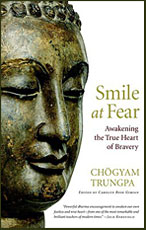"Sacredness is not trying to look on the bright side of life and using that as a stepping-stone, but it is unconditional cheerfulness that has no other side. It is just one side, one taste. From that, goodness begins to dawn in your heart. Therefore, whatever we experience, whatever we see, whatever we hear, whatever we think — all these activities have a sense of holiness or sacredness in them. The world is full of hospitality at that point. Sharp corners begin to dissolve, and the darkness begins to lift in our lives.
"This is not too good to be true. Such goodness and sacredness are unconditionally good. At the point of realizing this, we become decent human beings and real warriors. We need to remind ourselves over and over that this approach always has to be accompanied by the sitting practice of meditation. Meditation acts as a training ground, a stronghold, and out of that, the seed of friendliness to oneself is planted. The main point is to appreciate our world, which becomes the vajra world, the warrior's world, which is a cheerful world. It never becomes too good or too bad.
"For a true warrior, the basic notion of victory is not one-upmanship over your enemy. Victory is unconditional victory, based on unconditional warriorship. Sacredness means that fearlessness is carried out throughout everyday life situations, including brushing your teeth and washing the dishes. Fearlessness takes place all over the place, all the time.
"In the setting-sun or confused world, discipline and uniformity have been abused quite a lot. But acting with discipline and maintaining some uniformity does not have to be aggressive. Uniformity in the warrior's world can be a powerful vehicle for us to achieve one mind. That one mind is the mind of gentleness. The warrior's discipline is not an expression of aggression, but it is guarding against one's own aggression. So warriors should be very gentle, and not only gentle but resourceful, awake, and good human beings.
"For a warrior, whatever you wear is a uniform, in some sense. If you have two arms and two eyes and one nose, that is your uniform. Everybody has it! The artificial uniforms that are put on top of that in the setting-sun world are often an expression of aggression, obviously. But in the warrior's world, some uniformity is an expression of confidence and gentleness.
"Unconditional fearlessness is cheerful and very light. There is no need for any kind of cowardice or fear, or any moments of doubt. It might actually be better to speak of being doubtless rather than fearless. For the warrior, there is no doubt: there are no second thoughts about anything. Because the world is complete, as it is, there is no room for doubt. So the real notion of victory is not having to deal with an enemy at all.
"If victory is the notion of no enemy, then the whole world is a friend. That seems to be the warrior's philosophy. The true warrior is not like a person carrying a sword and looking behind his own shadow, in case somebody is lurking there. That is the setting-sun warrior's point of view, which is an expression of cowardice. The true warrior always has a weapon, in any case. Many things in your life function as a weapon, a vehicle for communication that cuts through aggression. It could be anything. If you are wearing a mustache, that could be your weapon. It's not necessary for the warrior to carry an artificial weapon, like a gun. Cowardly people carry guns because they are so cowardly, so afraid. One doesn't have to be afraid of touching a weapon, such as a gun, or even using it when necessary, but that doesn't mean you have to carry one all the time. The definition of warriorship is fearlessness and gentleness. Those are your weapons. The genuine warrior becomes truly gentle because there is no enemy at all."
